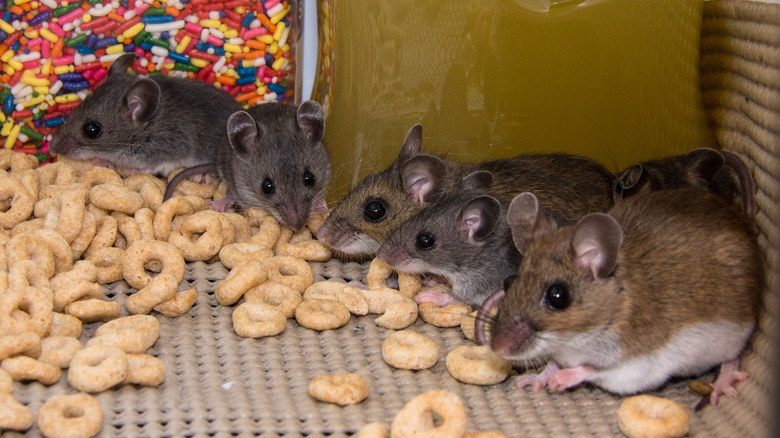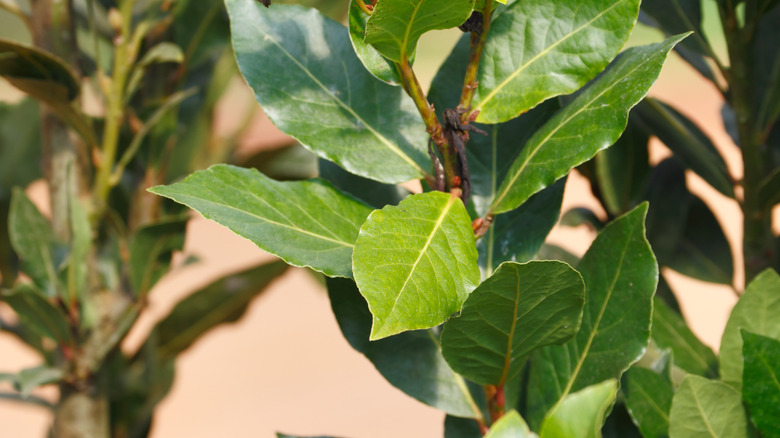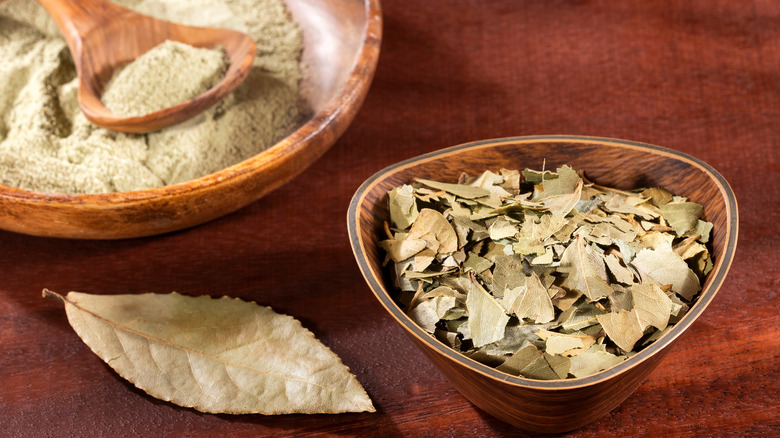Should You Use Bay Leaves To Deter Mice From Your Home?
You pop them in a pot of soup. They add a wonderfully herbal, floral fragrance with slight hints of menthol to your pasta sauces. Some people even attach them to the lid of their flour container to keep weevils at bay. But bay trees are one of those beautiful house plants that are also useful in non-culinary ways. Exhibit A: They're said to repel mice from a home. There are a few reasons cited for the bay leaf's pest-controlling effects. According to some online sources, mice find the bay smell enticing. It encourages them to eat the leaves, after which they promptly keel over, either by choking on the tough leaves or succumbing to their toxins. Other advice claims mice don't like the smell, keeping them away from where crumbled bay leaves are scattered.
Let's explore that first claim: if a rodent consumes a bay leaf, it will die. Quora member Shelly Wernette, responding to the question, "Can you kill rats with bay leaves?" said, "I can definitively say yes. One of mine ate a very tiny part of a bay leaf ... and he died within a couple of hours." Compelling but wholly anecdotal evidence. Though the bay leaves we use in cooking come from various plants, they all contain similar chemicals. That's what gives them like taste. All edible bay species — or, more precisely, their compounds — may be toxic for cats, dogs, and livestock in large amounts.
Bay leaf toxicity: the debate
The chemical class sesquiterpenes, found in bay leaves, is toxic to farm animals like cows, sheep, and horses, according to Cornell's Department of Animal Science. There's also at least one reported case, per the Journal of Emergency Medicine Case Reports, of hepatoxicity caused by bay leaves (Laurus nobilis) in a human patient. These findings may have led people to believe the leaves are toxic to all mammals. However, a 2023 study published in the EFSA Journal claims that using bay leaf extract in animal feed has no long-term consequences on animal health. What's more, researchers from Indonesia found that the various compounds in bay leaves (like ethanol) have little to no effect on fetal mice when eaten by their mothers (via Open Access Library Journal).
It also could stem from the fact that bay leaves are a natural insecticide; for example, stink bugs will be a thing of the past with this handy herb. Bay leaves contain "a camphor-like volatile oil" that repel insects, making them a natural insecticide and irritant, research published in Medicinal Plants of South Asia explains. There's also anecdotal evidence: people putting bay leaves in grain storage containers claim success (via Apartment Therapy). But again, this article only mentions that bugs hate bay leaves — not rodents. Perhaps the choking hazard theory has some validity. There's at least one case, published in BMJ, of a (human) patient visiting the hospital with a piece of bay leaf stuck in their throat. Once, a bay leaf shard perforated a woman's bowel, as reported in JAMA.
Test it for yourself
Bay leaves resemble the leaves of two plants toxic to humans: The cherry laurel and the mountain laurel. The visual similarity may have led people to conflate the harmful effects of these species with edible bay leaves. Could it be true that mice and rats find bay leaves literally odorous? Some pest control experts lump the leaf in with other strong-smelling (supposed) repellents like peppermint oil and rotten onions. In fact, the opposite is more likely. Researchers from the University of California, Davis, reported that wild rats were collecting California bay leaves and distributing them around their nests to repel fleas (via a 2002 issue of Behavioral Ecology).
As pest control expert Joe Jonovich writes for Nextgen Pet Solutions regarding various natural mice control tactics, including using bay leaves, "The true effectiveness of any of these methods is questionable, but it costs little to nothing to try them." If you agree, you may still want to give the bay leaf trick a go. One simple way is to place the leaves — whole, crumbled, or powdered — in places where you've seen mice or evidence of their habitation. Set a rock or something else small and heavy atop whole leaves to stop them blowing away. To keep mice out of your garden and house, plant bay trees around the perimeter of either. If you're handy, make a bay leaf spray by infusing the leaves in water, or get out your sewing machine and make pouches to fill with crushed, dried bay leaves. Leave these in your pantry, closets, and drawers. For best results, refresh the leaves or re-spray every five to seven days.


